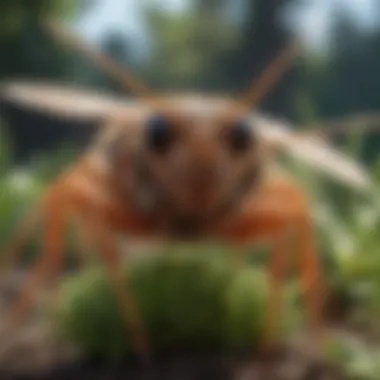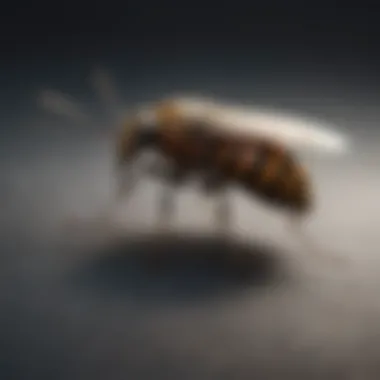Natural Pest Control Solutions for Philadelphia Homes


Intro
Natural pest control is gaining traction in urban landscapes like Philadelphia. With a growing consciousness about sustainability, homeowners are seeking solutions that minimize harm to the environment. Traditional pest control often relies on chemicals that may be hazardous to health and ecology. This shift toward natural methods aligns with a broader understanding of ecology and pest management. This article will explore pest identification, prevention strategies, and treatment options relevant to the Philadelphia area.
Pest Identification
Detailed descriptions of common pests
Understanding the common pests in Philadelphia is the first step towards effective control. The most prevalent pests include:
- Cockroaches: These resilient insects prefer warm, dark environments. They are notorious for their speed and ability to reproduce quickly.
- Ants: Various species, such as carpenter ants and fire ants, can infiltrate homes. Carpenter ants cause structural damage, while fire ants can inflict painful stings.
- Bed Bugs: Small, elusive insects that feed on blood during the night. Their bites can lead to discomfort and sleepless nights.
- Termites: Often referred to as the "silent destroyer," these pests can cause significant damage to wooden structures unnoticed.
Signs and symptoms of infestations
Identifying an infestation early can save considerable time and expense. Key signs include:
- Droppings: The presence of waste can indicate roach or rodent activity.
- Damage: Holes in wood or walls may suggest termite infestation.
- Bites: Unexplained skin irritations or bites likely signal bed bugs.
- Nests: Ants and rodents build nests that can be found in walls or under floors.
Prevention Strategies
Home maintenance tips for pest prevention
Regular upkeep of your home is crucial. Here are practical measures every homeowner can take:
- Seal entry points: Inspect windows, doors, and the foundation for gaps that pests could use to enter.
- Maintain cleanliness: Regularly cleaning kitchen areas prevents pest attraction. Consider using natural cleaning products.
- Manage waste: Ensure trash is stored in sealed containers and disposed of regularly.
Natural deterrents and barriers
Utilizing natural deterrents can effectively keep pests at bay. Common options include:
- Essential oils: Peppermint oil is known to repel spiders and ants. A few drops mixed with water can serve as an effective spray.
- Diatomaceous earth: This powdery substance can kill pests like cockroaches by dehydrating them when they come into contact.
- Beneficial insects: Introducing ladybugs or lacewings can help control aphid populations in your garden.
Treatment Options
Overview of chemical vs. natural treatments
When facing an infestation, the choice between chemical and natural treatments is significant. While chemicals can offer quick results, they raise health and environmental concerns. In contrast, natural methods often lack immediate effectiveness but present long-term benefits without hazardous side effects.
Step-by-step guides for DIY treatments
For homeowners inclined towards natural solutions, here are some simple DIY treatments:
- Homemade ant bait:
- Natural roach trap:
- Neem oil spray:
- Combine sugar and baking soda in equal parts.
- Place it where ants are active. The sugar attracts them while the baking soda acts as a poison.
- Use a jar with a few inches of water and a bit of oil at the bottom.
- Add some food (like bread) on top. Roaches will fall in and can't escape.
- Mix a few drops of neem oil with water in a spray bottle.
- Apply this onto infected plants to repel various pests.
"Natural pest control not only addresses the immediate need but also promotes a healthier living space for you and your family."
Foreword to Natural Pest Control
Natural pest control refers to methods of managing unwanted organisms without the use of synthetic chemicals. This approach is increasingly relevant, especially in urban settings like Philadelphia, where the integration of residential areas with nature presents unique challenges. By prioritizing eco-friendly strategies, homeowners can protect their properties while minimizing harm to the environment.
Natural pest control not only respects the ecological balance but also promotes the health of inhabitants, particularly in densely populated areas. When communities reduce reliance on chemical solutions, they foster a more sustainable environment. In this way, natural pest control can enhance the quality of life, reduce exposure to harmful substances, and maintain the natural predator-prey dynamics that contribute to ecosystem stability.


Most importantly, engaging in natural pest control practices encourages a more informed populace. As homeowners learn about the various pest-management techniques, they become key participants in their community's ecological health. This article will explore the essence of natural pest control, the common pests found in Philadelphia, their impacts, and effective methods to manage them sustainably.
Defining Natural Pest Control
Natural pest control encompasses a range of practices aimed at managing pest populations using environmentally friendly methods. By utilizing biological agents, cultural practices, and physical barriers, homeowners can reduce and mitigate pest problems effectively. This can include using natural predators, such as ladybugs to control aphid infestations, or employing methods like crop rotation to disrupt pest life cycles.
Notably, natural pest control does not imply passivity towards pest populations. Instead, it involves a proactive stance in using nature's tools to maintain ecological balance. This approach aligns with the principles of Integrated Pest Management (IPM) which seeks to combine various strategies for more effective pest control.
Importance in Urban Settings
Urban environments pose distinct challenges when it comes to pest management. High-density living creates an ideal situation for pests like rodents, cockroaches, and bed bugs to thrive. In Philadelphia, these pests can detract from residents' comfort and health. Therefore, natural pest control becomes an essential practice in addressing these concerns.
Natural strategies not only tackle the existing pest populations but also prevent future infestations. By understanding and manipulating the environment in which these pests exist, homeowners can significantly reduce the likelihood of pest encounters. For instance, employing physical barriers around gardens can keep pests at bay while nurturing the flora within.
Furthermore, natural pest control methods tend to be less harmful to friendly species, including pollinators essential for biodiversity. Therefore, a shift toward these practices can also help in enhancing the city's overall ecological integrity. This shift is not merely beneficial to individual homeowners but also to the community at large as it promotes sustainable living practices.
Common Pests in Philadelphia
Understanding the common pests in Philadelphia is crucial for future pest control efforts. Pests such as insects or rodents can cause distress for homeowners. More importantly, they pose health risks and can harm property. Recognizing these pests helps in implementing appropriate control strategies. The following sections detail how to identify these pests and understand their impacts on local homes.
Identifying Common Pests
Philadelphia is home to a variety of pests that can infiltrate homes and gardens. Common pests include:
- Cockroaches: Often found in kitchens and bathrooms. They thrive in warm, humid environments.
- Ants: Species like the pavement and carpenter ant are prevalent. They invade homes in search of food and shelter.
- Termites: Known for their destructive nature, they can undermine wooden structures.
- Rodents: Rats and mice can nest in attics or basements. They often enter through small openings.
- Bed Bugs: These pests are notorious for troubling homeowners, presenting challenges in control.
Proper identification begins with observing physical characteristics. Cockroaches have a glossy exterior, while ants vary in size and color. Knowing their habits and preferred environments is equally important. For example, termites are mostly found near sources of wood. Homeowners should closely inspect any unusual signs of activity, like droppings or damage to materials.
Impact of Pests on Local Homes
The impact of pests extends beyond mere annoyance. They can affect both the structural integrity and the health standards of local homes. Here are some key aspects:
- Health Risks: Pests like cockroaches and rodents are known carriers of diseases. They can contaminate food and surfaces, increasing the risk of respiratory issues and allergies.
- Property Damage: Termites and rodents can lead to significant damage. Their gnawing can compromise walls, insulation, and even electrical wiring, resulting in costly repairs.
- Emotional Distress: Dealing with pest invasions can create anxiety for homeowners. The fear of infestations may affect daily life significantly.
"Understanding the common pests in your area is the first step towards effective control."
In summary, recognizing and tackling pest-related issues early is vital. This section lays the groundwork for implementing natural pest control solutions. It is essential for homeowners in Philadelphia to be proactive in pest management practices.
Natural Solutions for Pest Management
Natural solutions for pest management are essential for maintaining a balanced ecosystem, especially in urban settings like Philadelphia. These methods focus on sustainable practices that are effective in controlling pests while minimizing harm to the environment. Homeowners are increasingly looking for ways to manage pest populations without resorting to harmful chemicals. This approach not only helps in keeping pests at bay but also enhances the overall quality of life by ensuring a safer home environment.
Utilizing natural pest control methods can also lead to cost-effective solutions for managing pest problems. Many biological and cultural practices are easy to implement and can be done with readily available materials. Furthermore, these methods align with growing environmental awareness and public interest in organic and sustainable living. In summary, natural solutions for pest management are crucial for promoting ecological health and enhancing local biodiversity, which directly benefits the community as well.
Biological Control Methods
Biological control methods involve the use of natural predators or parasites to manage pest populations. This technique is highly effective in reducing pests without harmful chemicals. For example, introducing ladybugs can help control aphid populations, which are common pests in gardens.
Some key points about biological control include:
- Natural Predators: Many insects, birds, and other wildlife are effective at controlling pest numbers.
- Sustainable Practices: These methods support a balanced ecosystem.
- Low Environmental Impact: They do not contribute to chemical pollution or harm non-target species.
Implementing these practical approaches can significantly reduce dependency on synthetic pesticides, fostering healthier gardens and landscapes.
Cultural Control Practices
Cultural control practices focus on modifying agricultural practices to reduce pest establishment and reproduction. These strategies include practices such as crop rotation, proper sanitation, and maintaining healthy soil.


Some effective cultural controls include:
- Crop Rotation: Changing the type of crops grown in a specific area each season can disrupt pest life cycles.
- Sanitation: Regular cleaning of garden beds and removing debris can limit pest habitat.
- Planting Resistant Varieties: Selecting pest-resistant plant varieties is another effective method to minimize pest problems.
These strategies encourage proactive rather than reactive pest management, which is essential for preventing infestations before they become significant problems.
Physical Barriers and Traps
Physical barriers and traps offer a direct, non-toxic approach to pest management. These tools can effectively inhibit pest movement into specific areas or capture pests that are already present. Some common examples include:
- Row Covers: These protect young plants from insect pests while allowing light and water to penetrate.
- Insect Traps: Sticky traps can capture flying insects, helping to keep populations under control.
- Fencing: Installing barriers around gardens can deter larger pests such as deer or rabbits.
The use of physical barriers not only protects plants but also minimizes the use of pesticides, aligning well with natural pest control goals.
"Implementing integrated pest management strategies can drastically reduce the need for chemicals while ensuring the health of both the environment and local communities."
Evidence-Based Organic Treatments
Evidence-based organic treatments play a crucial role in pest management strategies, especially within urban contexts like Philadelphia. As residents increasingly seek sustainable alternatives to chemical pesticides, understanding these organic methods becomes vital. Evidence-based treatments rely on scientific research and practical efficacy, ensuring not just safety for the environment but also effectiveness in controlling pests. By employing these methods, individuals can mitigate health risks associated with synthetic chemicals and promote biodiversity in their local ecosystems.
Essential Oils and Repellents
Essential oils are gaining notoriety as a potent natural defense against a variety of pests, including mosquitoes, ants, and spiders. Oils derived from plants, such as peppermint and eucalyptus, contain compounds that are repelling for many insects. The advantages of using these oils include their organic origin, pleasant scent, and reduced toxicity compared to synthetic alternatives.
Application Methods:
- Dilution: Mix essential oils with water and a carrier oil, like coconut oil, before application. This enhances skin safety, especially if used topically.
- Sprays: Create a spray solution for areas where pests are common, ensuring to focus on entry points.
- Diffusion: Utilizing oil diffusers can help in creating an aroma that discourages pests without direct application.
Plant-Based Insecticides
The use of plant-based insecticides provides a feasible solution to pest control with minimal environmental impact. These insecticides target specific pests while being less harmful to non-target species, including beneficial insects. Examples of effective plant-based options include neem oil and pyrethrin, both offering naturally occurring insecticidal properties.
Key Benefits:
- Selectivity: They often affect only targeted insect species, preserving beneficial insects.
- Biodegradability: Plant-based insecticides break down more rapidly in the environment, reducing long-term ecological risks.
Before applying any plant-based insecticides, it is essential to read product labels for correct usage and safety precautions.
Companion Planting Techniques
Companion planting is a method that harnesses the natural ability of certain plants to deter pests and support each other. This technique is particularly beneficial for home gardens and community green spaces in Philadelphia.
Examples of Beneficial Combinations:
- Marigolds and Tomatoes: Marigolds can repel nematodes and other pests that commonly afflict tomatoes.
- Basil and Peppers: Basil not only enhances the flavors in cooking when grown alongside peppers, but it also helps deter aphids.
By integrating companion planting into everyday gardening practices, homeowners create an environment that naturally curtails pest infestations while enhancing their gardening yields.
"Evidence-based organic treatments offer not just a way to manage pests, but also an opportunity to build a healthier ecosystem at home."
Using these organic strategies, residents of Philadelphia can approach pest control in a thoughtful and effective manner, advancing eco-friendly practices in their own homes.
Community Resources
Community resources play a significant role in the implementation of natural pest control methods in Philadelphia. The collaboration between local organizations, residents, and educational initiatives enhances the understanding and effectiveness of eco-friendly pest management strategies. People often seek guidance on how to manage pests naturally, and community resources provide valuable information, support, and connection.
Local pest control organizations serve as the backbone for advocacy and education in this realm. They offer a wealth of knowledge regarding the pests common to the Philadelphia area and the natural methods available to control them. Members of these organizations often arm themselves with research-driven insights, promoting strategies that minimize chemical use and environmental impact. By tapping into the expertise of these groups, homeowners can adopt best practices and make informed decisions about pest management.


Workshops and educational programs further amplify this support by providing hands-on training and resources. These events often facilitate community engagement and empower residents. They cover a range of topics, such as how to effectively use essential oils and plant-based insecticides. Workshops also address practical skills, like building physical barriers or using traps. By attending these programs, participants gain a deeper understanding of pest behavior, ecosystem balance, and sustainable practices.
"Through education and local support, individuals can transform their approach to pest control, leading to healthier homes and communities."
Engaging with community resources not only serves the immediate need of pest control but also fosters a culture of sustainability and responsibility among residents. Understanding the local ecosystem and actively participating in community initiatives builds strong relationships. More importantly, it also cultivates a sense of shared responsibility, which is essential for long-term ecological health. As such, it’s vital for homeowners to seek out these resources and get involved in local efforts aimed at addressing pest issues sustainably.
Local Pest Control Organizations
Local pest control organizations play an essential role in providing residents with access to current information and resources on natural methods. These groups include nonprofits, educational institutions, and local government initiatives dedicated to promoting sustainable pest management practices. They often conduct research into various pest control methods and their ecological impacts.
These organizations regularly host workshops, webinars, and seminars that educate the public about effective natural approaches. They may also facilitate partnerships between homeowners and specialists, allowing for tailored advice that meets individual needs. With access to expert insight, residents can learn about safe pest eradication and management strategies tailored to Philadelphia's unique environment.
Workshops and Educational Programs
Workshops and educational programs are cornerstone elements of the community's approach to pest control. Many of these initiatives are freely accessible, enabling diverse participation among residents. The curriculum typically ranges from practical training on crafting organic repellents to understanding pest life cycles.
Hands-on training emphasizes real-life applications, allowing participants to leave with actionable skills. Additionally, these workshops often create networking opportunities among attendees, fostering a sense of community. By learning together, residents can exchange tips and techniques, enhancing their collective knowledge about natural pest control methods.
In summary, the synergy between community resources, local pest control organizations, and educational programs is pivotal for promoting sustainable practices. It enhances residents’ understanding of natural pest control, increasing their confidence in managing pest problems effectively.
Regulatory Considerations
Understanding the regulatory framework surrounding pest control is crucial in any urban area, including Philadelphia. These regulations exist to ensure the safety of the public and the environment while facilitating effective management of pest populations. With a growing emphasis on sustainable practices, it is necessary for both homeowners and pest control professionals to be aware of local guidelines.
Local Pest Control Regulations
In Philadelphia, natural pest control methods are subject to a series of local regulations that govern their use. These regulations often outline approved techniques and products, emphasizing the necessity for safety and environmental protection. Homeowners must familiarize themselves with these rules to avoid penalties and ensure that their pest management practices align with city ordinances.
For instance, any pest control service operating in Philadelphia must comply with the Philadelphia Code, which mandates the use of environmentally safe methods wherever possible. This includes restrictions on certain chemical pesticides and a requirement that companies provide clients with documentation detailing the treatments used.
Engaging with local regulations not only supports a safer environment but also enhances the community's overall health. Many pest control companies in the area are knowledgeable about these local laws and can guide homeowners in making compliant yet effective choices.
Chemical Restrictions and Labeling
Chemical restrictions are a significant component of Philadelphia's pest control regulations. Not all pesticides are permitted for use in residential areas, especially those known to be hazardous to health or the ecosystem. Homeowners should always read labels carefully. Regulations require clear labeling that informs users about the potential risks and safe handling procedures for any chemicals used.
It is also important for residents to be aware of any chemicals that are banned or restricted in the city. Such chemicals can include ingredients that are deemed too hazardous to public health or the environment. Understanding these restrictions ensures that homeowners choose safe alternatives when addressing pest issues.
For effective pest management while adhering to regulations, consider the following actions:
- Research the active ingredients in pest control products before purchase.
- Look for eco-friendly or organic certifications on labels.
- Consult with pest control professionals who are knowledgeable about local laws.
By being informed on regulations and chemical restrictions, homeowners can protect their families and contribute to a healthier urban ecosystem.
End and Future Directions
The topic of natural pest control is vital for individuals in Philadelphia as it aligns with the growing awareness of ecological responsibility. Homeowners are seeking efficient ways to manage pests without compromising health or the environment. As discussed in this article, there are many benefits to embracing natural methods over conventional pesticides. These practices do not only assist in managing pests effectively, but they also enhance the local ecosystem and promote biodiversity. Community involvement and awareness serve as crucial elements in pushing for sustainable pest control.
Summary of Natural Pest Control Benefits
Natural pest control methods offer numerous advantages, which can be summarized as follows:
- Healthier Home Environments: By minimizing the use of chemicals, households can protect the health of family members and pets. Natural methods reduce the risk of exposure to harmful substances.
- Ecological Benefits: These practices support local wildlife, including beneficial insects like pollinators. A balanced ecosystem can help naturally regulate pest populations.
- Cost-Effectiveness: Sustainable practices often require less financial investment in the long run. Utilizing natural deterrents or introducing beneficial species can lead to significant savings.
- Community Engagement: Involving local resources and educational programs fosters a sense of community, enhancing knowledge and cooperation among neighbors.
Information on natural pest control methods can be beneficial for homeowners, allowing them to make informed decisions. Many times, taking a proactive approach to pest management can prevent infestations from developing into larger issues.
Advancements in Sustainable Practices
Sustainable practices in pest control are constantly evolving. Innovations such as integrated pest management (IPM) have gained traction, offering holistic approaches to pest management. This method combines various strategies with a focus on reducing reliance on chemical solutions.
Recent advancements include the development of biopesticides derived from naturally occurring organisms. These substances are less toxic and have shown effectiveness against various pests. Further research is ongoing to discover more plant-based substances that can serve as effective insecticides.
In urban settings like Philadelphia, sustainable practices are not just about pest control but involve understanding the city's ecology. Homeowners are encouraged to adopt practices such as:
- Utilizing Native Plants: These plants attract beneficial insects and reduce the need for chemical interventions.
- Implementing Rain Gardens: These gardens assist in managing stormwater runoff and can provide habitats for helpful wildlife.
- Participating in Workshops: Local resources such as educational programs can enhance community knowledge about pest management strategies.



